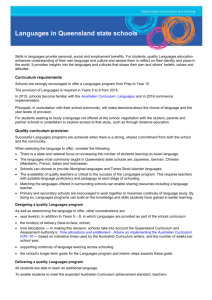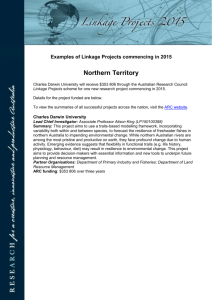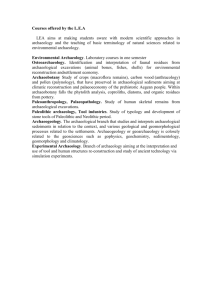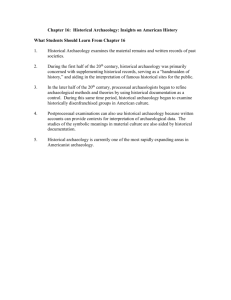Overview - University of Queensland
advertisement
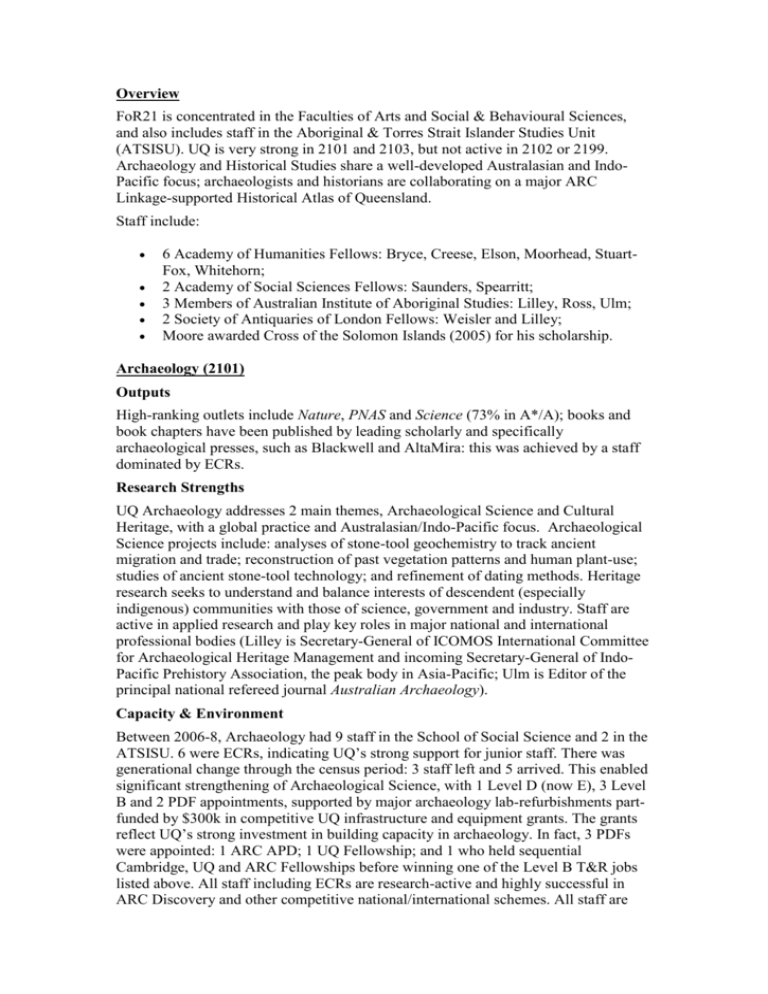
Overview FoR21 is concentrated in the Faculties of Arts and Social & Behavioural Sciences, and also includes staff in the Aboriginal & Torres Strait Islander Studies Unit (ATSISU). UQ is very strong in 2101 and 2103, but not active in 2102 or 2199. Archaeology and Historical Studies share a well-developed Australasian and IndoPacific focus; archaeologists and historians are collaborating on a major ARC Linkage-supported Historical Atlas of Queensland. Staff include: 6 Academy of Humanities Fellows: Bryce, Creese, Elson, Moorhead, StuartFox, Whitehorn; 2 Academy of Social Sciences Fellows: Saunders, Spearritt; 3 Members of Australian Institute of Aboriginal Studies: Lilley, Ross, Ulm; 2 Society of Antiquaries of London Fellows: Weisler and Lilley; Moore awarded Cross of the Solomon Islands (2005) for his scholarship. Archaeology (2101) Outputs High-ranking outlets include Nature, PNAS and Science (73% in A*/A); books and book chapters have been published by leading scholarly and specifically archaeological presses, such as Blackwell and AltaMira: this was achieved by a staff dominated by ECRs. Research Strengths UQ Archaeology addresses 2 main themes, Archaeological Science and Cultural Heritage, with a global practice and Australasian/Indo-Pacific focus. Archaeological Science projects include: analyses of stone-tool geochemistry to track ancient migration and trade; reconstruction of past vegetation patterns and human plant-use; studies of ancient stone-tool technology; and refinement of dating methods. Heritage research seeks to understand and balance interests of descendent (especially indigenous) communities with those of science, government and industry. Staff are active in applied research and play key roles in major national and international professional bodies (Lilley is Secretary-General of ICOMOS International Committee for Archaeological Heritage Management and incoming Secretary-General of IndoPacific Prehistory Association, the peak body in Asia-Pacific; Ulm is Editor of the principal national refereed journal Australian Archaeology). Capacity & Environment Between 2006-8, Archaeology had 9 staff in the School of Social Science and 2 in the ATSISU. 6 were ECRs, indicating UQ’s strong support for junior staff. There was generational change through the census period: 3 staff left and 5 arrived. This enabled significant strengthening of Archaeological Science, with 1 Level D (now E), 3 Level B and 2 PDF appointments, supported by major archaeology lab-refurbishments partfunded by $300k in competitive UQ infrastructure and equipment grants. The grants reflect UQ’s strong investment in building capacity in archaeology. In fact, 3 PDFs were appointed: 1 ARC APD; 1 UQ Fellowship; and 1 who held sequential Cambridge, UQ and ARC Fellowships before winning one of the Level B T&R jobs listed above. All staff including ECRs are research-active and highly successful in ARC Discovery and other competitive national/international schemes. All staff are active in RHD supervision, with 6 PhD and 1 MPhil completions: 3 of these PhDs won prizes or high commendations; Haslam received a highly-commended PhD with publications in high-impact international journals and won a Cambridge PDF (later moved to Oxford).+ Collaboration UQ staff work widely across disciplines at UQ and with researchers in Australia and overseas. At UQ, there are strong links with Earth Sciences (papers in Science and other top journals; ARC ~$225K), History (ARC ~$600K) and Architecture (ARC ~$365K; also involving UQ Social Anthropology as well as Griffith Earth Science, Melbourne Linguistics and UNSW Human Biology). Major external joint projects include ARC, British Academy, Canadian SSHRC, Chinese Academy of Sciences, and French CNRS networks and ~$4.7M in grants. Other externally-funded collaborations (Nature, Science, PNAS, refereed books) link UQ researchers with Berkeley, Cambridge, Oxford, Stanford, UCL, Uppsala and many other institutions. ECRs are very active in national/international joint research, individually and with senior UQ staff. Type UQ archaeology encompasses basic and applied research, emphasising links between them. Archaeology generally – and especially Archaeological Science – is mostly basic research, but staff also do applied research in connection with Cultural Heritage projects. Similarly, much Cultural Heritage research is basic but staff do applied research (or have their results applied by others) in practical management contexts (Lilley’s assessments of UNESCO World Heritage nominations for ICOMOS, Paris). Historical Studies (2103) Outputs Staff focus on monographs and book chapters, with a stable average 6 major monographs pa, 2003-8. Just over half the 39 books were published by leading international scholarly presses: 5 CUP, Cambridge Scholars, Edizioni Gonnelli, Peter Lang, Het Spectrum, OUP, Palgrave Macmillan, 6 Routledge, Tauris, Sharpe, SUNY Press, University of Hawaii Press. Another 7 books on Australian or regional subjects were published by national scholarly presses: Asia Pacific Press, 3 UNSW Press, 2 UQP. Of the 114 chapters, ~38% were published by US or European scholarly presses, ~13% by Asian university and academic publishers, reflecting research strengths in Southeast and East Asian history, and ~25% with national scholarly presses. The remaining ~25% were mostly on aspects of Queensland history too specialised to secure national publication. There has been a clear trend towards publication in journals of higher national/international standing since 2006. Research Strengths UQ is one of the strongest centres for Historical Studies nationally. Concentrated in the School of History, Philosophy, Religion & Classics (HPRC), it is also practised in other Schools in the Faculties of Arts, Social & Behavioural Sciences, and Health Sciences. Strengths are in the ancient world and the 19th-21st centuries, with regional foci on Australian, European (especially Britain and Germany), U.S., Asian (China, Japan, Indonesia) and Pacific history. Research is organised around the themes of Australian Social and Cultural History and International History of Governance and Ideology (2 of the Faculty’s 5 areas of research excellence), with ancillary themes of Cultural History (an emerging Faculty strength), Greek and Roman history and Sports History (an emerging cross-faculty strength). Capacity & Environment HPRC’s ~23 historians have an outstanding competitive grants record. For example, during 2006-7, 10 held ARC Discovery or Linkage grants. Major UQ institutional investment includes $154K for library material on health and scientific history (2003), and $106K for Muslim Southeast Asian and Russian history (2004). A specialist librarian services historical research needs. There are new research cores in Queensland history, and an innovative Cultural History research grouping. Eminent professorial researchers (Elson, Spearritt) have respectively developed Indonesian and Queensland studies. Staff are active as journal editors (Australian Journal of Politics & History (Bonnell), Journal of Australian Studies (Crotty)), on international editorial boards and national scholarly bodies (Moore was inaugural President (2006-10) of the Australian Association for the Advancement of Pacific Studies). There has been significant staff renewal with 6 new appointments since 2007 (1E, 1D, 4B). ECRs are strongly supported by UQ start-up grants and mentoring with < $12K each to develop ARC competitiveness. Historical Studies has a large RHD complement, averaging c. 70 EFTSL p.a.; they receive research travel support, attend 6 History seminars per semester and contribute to biannual “History in the Making” conferences. Numerous RHD students have secured lectureships/postdoctoral fellowships (for example at U of Virginia, U Northern Illinois, RMIT, U of Tasmania, U of SA), a 2005 Fulbright, and work in industry (Rio Tinto), the Australian National Library, and senior government positions (Afghanistan Government, Australian Department of PM and Cabinet, Office of National Assessments). Collaboration There is little intensive internal research collaboration: most researchers are in discrete fields requiring command of languages and specific cultural experience. Externally, they engage extensively in national and international collaborations: Pritchard works closely with historians of ancient Greece at Copenhagen, Stanford and Yale; Moore collaborates with ANU and Australian/Pacific cultural institutions; Low has organized conferences with Johns Hopkins scholars, resulting in joint A* publications; Lai collaborates with the Chinese and Shanghai Academies of Social Sciences; Spearritt’s research on urban culture and Queensland involves experts from UQ, QUT and Griffith, government departments, Brisbane and regional city councils and the State Library of Queensland; Elson and Moore are heavily engaged in the ARC Asia-Pacific Research Network, which provides crucial support for networking Asian and Pacific scholarship nationally/internationally. Type Research is generally basic, although it is frequently translated into popular and practice forms: Spearritt and Ginn’s expertise in Queensland history has led to research consultancies on museum practice and a $3.35m Qld Government-funded project providing authoritative new digital resources on Queensland’s history and government; Moore’s Solomons connections led to his editing Sir Peter Kenilorea’s autobiography.
